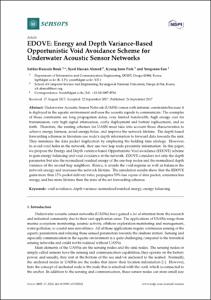Department of Electrical Engineering and Computer Science
CSI(Cyber-Physical Systems Integration) Lab
1. Journal Articles
Full metadata record
| DC Field | Value | Language |
|---|---|---|
| dc.contributor.author | Bouk, Safdar Hussain | - |
| dc.contributor.author | Ahmed, Syed Hassan | - |
| dc.contributor.author | Park, Kyung-Joon | - |
| dc.contributor.author | Eun, Yong-Soon | - |
| dc.date.available | 2017-11-20T11:49:52Z | - |
| dc.date.created | 2017-11-01 | - |
| dc.date.issued | 2017-10 | - |
| dc.identifier.issn | 1424-8220 | - |
| dc.identifier.uri | http://hdl.handle.net/20.500.11750/4702 | - |
| dc.description.abstract | Underwater Acoustic Sensor Network (UASN) comes with intrinsic constraints because it is deployed in the aquatic environment and uses the acoustic signals to communicate. The examples of those constraints are long propagation delay, very limited bandwidth, high energy cost for transmission, very high signal attenuation, costly deployment and battery replacement, and so forth. Therefore, the routing schemes for UASN must take into account those characteristics to achieve energy fairness, avoid energy holes, and improve the network lifetime. The depth based forwarding schemes in literature use node’s depth information to forward data towards the sink. They minimize the data packet duplication by employing the holding time strategy. However, to avoid void holes in the network, they use two hop node proximity information. In this paper, we propose the Energy and Depth variance-based Opportunistic Void avoidance (EDOVE) scheme to gain energy balancing and void avoidance in the network. EDOVE considers not only the depth parameter, but also the normalized residual energy of the one-hop nodes and the normalized depth variance of the second hop neighbors. Hence, it avoids the void regions as well as balances the network energy and increases the network lifetime. The simulation results show that the EDOVE gains more than 15% packet delivery ratio, propagates 50% less copies of data packet, consumes less energy, and has more lifetime than the state of the art forwarding schemes. © 2017 by the authors. | - |
| dc.language | English | - |
| dc.publisher | MDPI AG | - |
| dc.title | EDOVE: Energy and depth variance-based opportunistic void avoidance scheme for underwater acoustic sensor networks | - |
| dc.type | Article | - |
| dc.identifier.doi | 10.3390/s17102212 | - |
| dc.identifier.wosid | 000414931500054 | - |
| dc.identifier.scopusid | 2-s2.0-85030165997 | - |
| dc.identifier.bibliographicCitation | Sensors, v.17, no.10 | - |
| dc.description.isOpenAccess | TRUE | - |
| dc.subject.keywordAuthor | Depth variance | - |
| dc.subject.keywordAuthor | Energy balancing | - |
| dc.subject.keywordAuthor | Normalized residual energy | - |
| dc.subject.keywordAuthor | Void avoidance | - |
| dc.citation.number | 10 | - |
| dc.citation.title | Sensors | - |
| dc.citation.volume | 17 | - |
| dc.description.journalRegisteredClass | scie | - |
| dc.description.journalRegisteredClass | scopus | - |
| dc.relation.journalResearchArea | Chemistry; Engineering; Instruments & Instrumentation | - |
| dc.relation.journalWebOfScienceCategory | Chemistry, Analytical; Engineering, Electrical & Electronic; Instruments & Instrumentation | - |
| dc.type.docType | Article | - |
- Files in This Item:
-
 기타 데이터 / 1.46 MB / Adobe PDF
download
기타 데이터 / 1.46 MB / Adobe PDF
download



